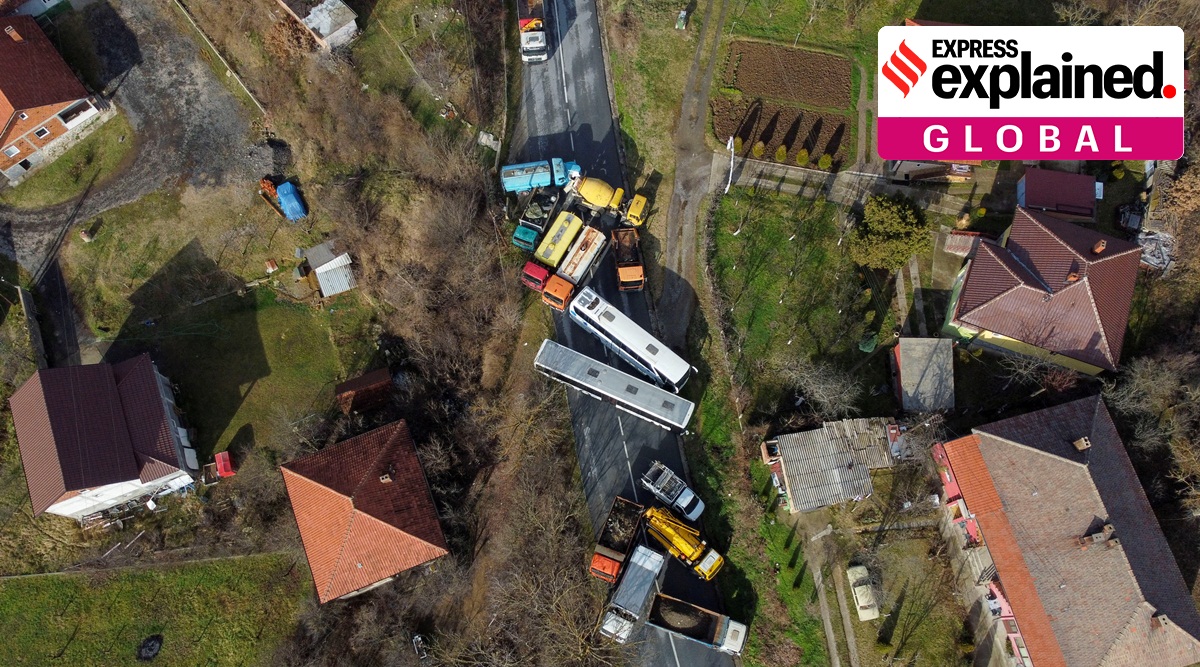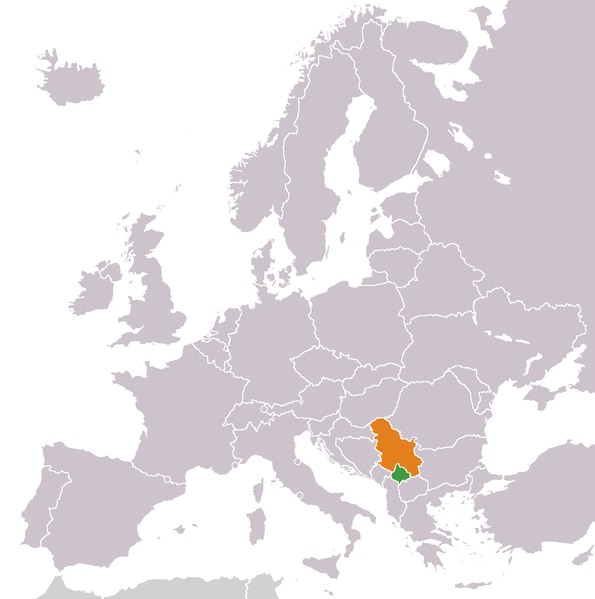Why ethnic tensions are flaring again in northern Kosovo
Kosovo won independence from Serbia in 2008, almost a decade after a guerrilla uprising. Serbia, however, still considers Kosovo to be an integral part of its territory and rejects suggestions it is whipping up tensions and conflict within its neighbour's borders.
 A roadblock is seen in Rudare, near the northern part of the ethnically-divided town of Mitrovica, Kosovo, December 28, 2022. (Photo via REUTERS/Florion Goga)
A roadblock is seen in Rudare, near the northern part of the ethnically-divided town of Mitrovica, Kosovo, December 28, 2022. (Photo via REUTERS/Florion Goga) Kosovo Serbs who have been blocking roads in northern Kosovo for 19 days have agreed to start removing barricades from Thursday morning, bowing to calls by the United States and the European Union to defuse tensions. Serbian President Aleksandar Vucic, who met Serbs from northern Kosovo in the Serbian town of Raska, said the process of removing barricades will begin on Thursday morning.
“It is a long process and it will take a while,” Vucic said.
He also added that the United States and European Union, which are mediating talks between Belgrade and Pristina to resolve outstanding bilateral issues, have guaranteed that none of the Serbs who set up barricades will be prosecuted. Removal of the barricades is expected to defuse ongoing tensions between Belgrade and Pristina.
This comes less than a week after Serbia said it had put its army on the highest combat alert following days of escalating tensions between Belgrade and Pristina. Serbia’s defence ministry said that given the latest events in the region and Belgrade’s belief that Kosovo was preparing to attack Serbs and forcefully remove the barricades, Vucic had ordered Serbia’s army and police to be put on the highest alert. Here are some facts about the standoff:
Why are there tensions?
Kosovo won independence from Serbia in 2008, almost a decade after a guerrilla uprising against Belgrade’s repressive rule. Serbia, however, still considers Kosovo to be an integral part of its territory and rejects suggestions it is whipping up tensions and conflict within its neighbour’s borders. Albanian-majority Kosovo declared independence with the backing of the West, following a 1998-99 war in which NATO intervened to protect ethnic Albanians.
 A map of Europe with Serbia marked in orange and Kosovo in green colour. (Via Wikimedia Commons)
A map of Europe with Serbia marked in orange and Kosovo in green colour. (Via Wikimedia Commons)
Around 50,000 ethnic Serbs living in northern Kosovo refuse to recognise the government in Pristina or the status of Kosovo as a separate country. They have the support of many Serbs in Serbia and its government.
Ethnic Serbs do not recognise Kosovan state institutions, and account for 5% of Kosovo’s 1.8 million people, with ethnic Albanians making up about 90%. The Serbs have vented their hostility by refusing to pay Kosovo’s power operator for the electricity they use for example and frequently attacking police who try to make arrests.
Belgrade accuses Pristina of trampling on the rights of minority Serbs.
Why did tensions flare again?
Fresh ethnic tensions have erupted since Dec. 10 when Serbs erected multiple roadblocks and exchanged fire with police after the arrest of a former Serb policeman for allegedly assaulting serving police officers during a previous protest. The arrest triggered violent protests by Kosovo’s Serb minority. He was released from custody on December 29 and put under house arrest, a court spokesperson said, in a bid to ease tensions between Kosovo and Serbia.
The stand-off comes after months of trouble over the issue of car licence plates. Kosovo has for years wanted the approximately 50,000 Serbs in the north to switch their Serbian car license plates to ones issued by Pristina, as part of the government’s desire to assert authority over its territory.
On July 31, Pristina announced a two-month window for the plates to be switched over, triggering protests, but it later agreed to push the implementation date back to next year.
Ethnic Serb mayors in northern municipalities, along with local judges and some 600 police officers, resigned in November in protest at the looming switch.
What do the Serbs want?
Serbs in Kosovo want to create an association of majority-Serb municipalities that would operate with greater autonomy. Serbia and Kosovo have made little progress on this and other issues since committing in 2013 to the EU-sponsored dialogue.
What is the role of Nato and the EU, and where does Russia come in?
For more than 20 years, Kosovo has been a source of tension between the West, which backed its independence, and Russia, which supports Serbia in its efforts to block Kosovo’s membership of global organisations, including the United Nations.
NATO has about 3,700 troops stationed in Kosovo to maintain the peace. The alliance said it would intervene in line with its mandate if stability in the area were jeopardized. The European Union Rule of Law Mission in Kosovo (EULEX), which arrived in 2008, still has around 200 special police officers there.
The Kremlin, for its part, denied the Kosovo interior minister’s claims that Russia was influencing Serbia to destabilise Kosovo, saying that Serbia was defending the rights of ethnic Serbs.
The European Union and the United States are concerned about the continued tense situation in the north of Kosovo, they said in a joint statement released by the U.S. State Department on Wednesday, urging the parties to de-escalate the situation.
- 01
- 02
- 03
- 04
- 05





































